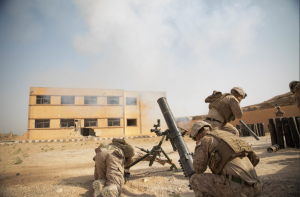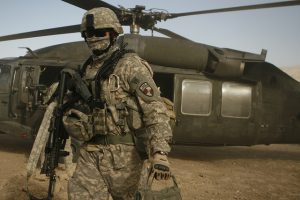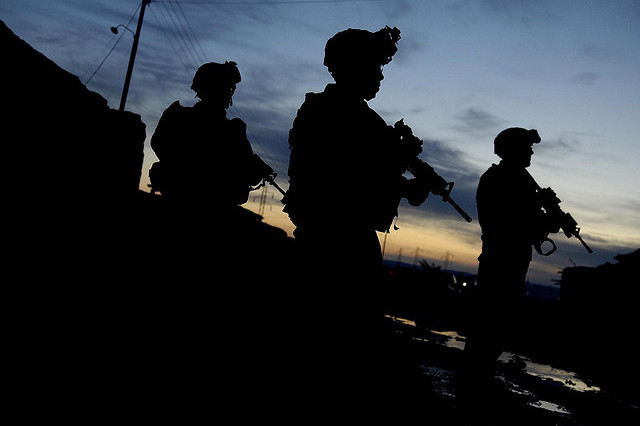Jennifer Rubin has spent much time advocating for escalating U.S. measures on Iran. At Commentary, she called a U.S. attack on the Islamic Republic the “best of the disagreeable options.” Now, at the Post, Rubin seems to have softened this view, calling for “more fruitful actions.”
But Rubin’s reporting on Iran issues often reflects the same sort of sloppy disregard for facts we saw in the run-up to the Iraq War: Neoconservative pundits and journalists pass speculation off as fact, ignoring context and mitigating factors that might cast doubt on their pronouncements.
Take, for example, Rubin’s Dec. 27 story about “the unchecked Iranian menace.” She draws all kinds of conclusions from a post by Stephen Hayes at the Weekly Standard. (The link to Hayes’s piece in Rubin’s post takes one to the login page for the Post‘s content management system.) Hayes’s post is itself based on an article from the Long War Journal, a project of the neoconservative think tank the Foundation for Defense of Democracies.
The LWJ piece said that a Taliban member captured by ISAF (international forces in Afghanistan) was also a member of Iran’s elite Qods Force, a branch of the Islamic Republic’s Revolutionary Guards. But the article had been updated from the original version (before either Hayes or Rubin picked it up).
The older version (reprinted here), as the newer one acknowledges, said that the claim about the Qods Force came from ISAF. The updated version noted that ISAF has since retracted the claim (here is the ISAF press release), but that an unnamed “senior U.S. intelligence official” corroborated the earlier version of events.
The story that the Taliban fighter was a member of the Qods force may well be true. (On the Saudi-owned Al Arabiya television channel on Dec. 27, a London-based expert on Arab-Iranian relations said the fighter was indeed a Qods member.) But LWJ, to its credit, noted the ISAF retraction. Steven Hayes, writing at the Standard, did the same, albeit in a back-handed way:
Interestingly, ISAF officially confirmed the dual role of the captured operative, but later reversed itself. But Long War Journal’s Bill Roggio has a source that stands by the original claim.
Let’s hope we’re not muzzling the military now, too.
Then Jennifer Rubin picked up Hayes and… nada on the ISAF retraction.
Honest journalists feel the need to include critical context in their stories, even if that context can cast doubt on their report. While backed up by other sources, that’s exactly what this ISAF retraction did to the Taliban-Qods story — official Western military pronouncements tend to carry that kind of weight.
But Rubin, when it comes to Iran, seems incapable of honesty, let alone acknowledging facts that might cast doubt on her narrative of an ‘evil’ Iran. The fact that a writer at the ideological Weekly Standard felt the need to include the context that Rubin chose to leave out does not bode well for journalistic standards at the Washington Post.





Wait, Ali, did you just call the Weekly Standard’s Steven Hayes and Long War Journal’s Bill Roggio “honest journalists”?
How generous of you!
One begrudging and equivocated retraction/correction/update is not nearly enough to give those lying warmongers any credibility.
You think Al Arabiya’s claim that a Qods Force operative was serving with the Taliban is legit? You know, I’m obviously not there on the ground, and I’m not (for once) claiming to be all-seeing, but I would be very surprised to find Iranian cadres serving with the Taliban. Saudi might like us to think so; hence the Al-Arabiya story. Why would ISAF retract the Qods claim if it were true? Surely evidence of Iranian involvement would be something ISAF would want to publicize.
Seems to me likely that the original story was in fact a propaganda ploy on somebody’s part. I’ll let someone else name the usual suspects.
Son..accept my observation in Afghanestan.
I donot see any colaberation and cooperation btween Sepah Quds of IRI and Taliban +Alqadeh.
This is imposible..they are like knife and cheese
against each other and donot trust each other..
I donot care what neo…war mongers reporter want to cook.I havenot seen any legit evidence of
Quds+others in Afghanistan.
Col Ray N.
A little surprised that made the cut.
RE: “She draws all kinds of conclusions from a post by Stephen Hayes at the Weekly Standard…Hayes’s post is itself based on an article from the Long War Journal, a project of the neoconservative think tank the Foundation for Defense of Democracies. – Ali Gharib
MY SNARK: In poker, I believe they call this game “pass the trash”.